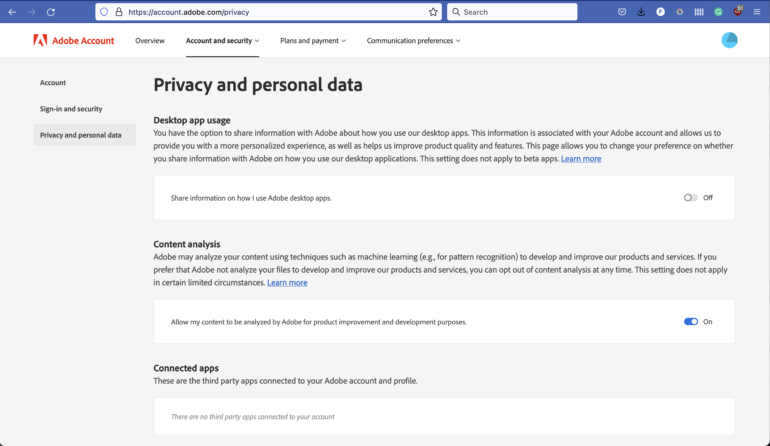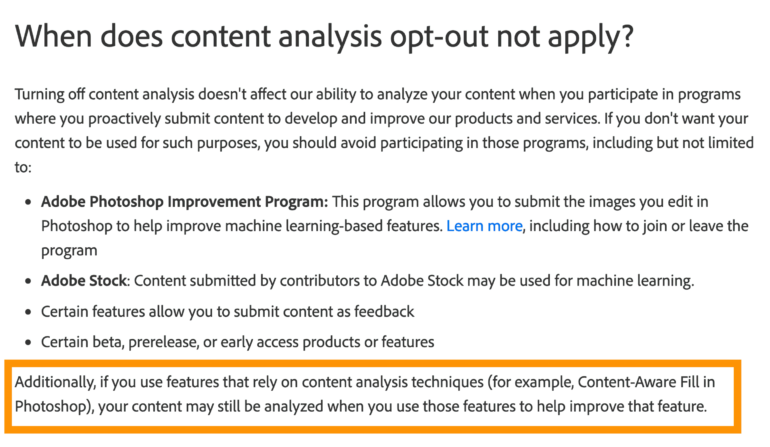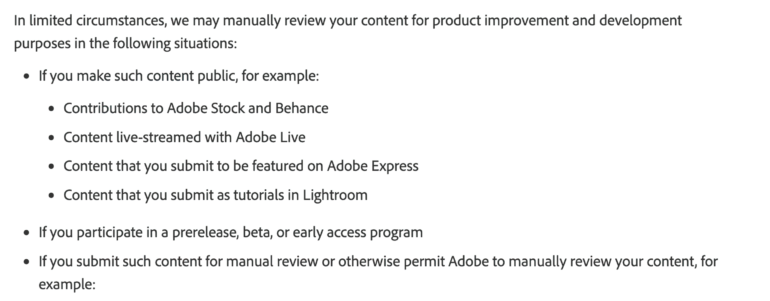Are you an Adobe Creative Cloud user? It’s possible that images stored in your account there are being used to train Adobe’s AI. This was pointed out by the account for Krita, an application used for creating digital art, which posted a concerned tweet recently. Apparently, users opted in for Adobe’s AI image analysis by default. This is part of their Privacy and Personal Data terms and conditions. I certainly don’t remember doing this, so I did some digging around to see what the fine print was.
How Often Do You Read Ts & Cs?
I think it was in high school when a close friend asked me if I ever closely read the terms and conditions when installing software on my PC. Given how slow the machines were back then and how eager we were to install software (read: computer games) on our systems, I doubt any of us actually read the fine print. We didn’t even have to scroll down to the end of the T&C. We just clicked Accept, and it proceeded to the installation. “Well, if no one does, what’s stopping the software companies from having us sign over our savings and property to them as part of the T&Cs?” he joked. We had a good chuckle about it back then.
But now, when I look back at it, I realize there’s a lot we take for granted these days. Trust in software companies is one such concept. Imagine a scenario where you have an agreement with your landlord. Under this agreement, he comes by once a month to take pictures of the house’s exterior for whatever reason. This continues for some years. Until one fine day, you discover close-up images of yourself while inside the house. Then you find out your landlord took these. You never remember agreeing to this, so you confront him about it. He shrugs off any concern and claims this was part of your most recent leasing renewal contract. You probably scribbled your signature hastily to renew the tenancy contract, but that sort of explanation would infuriate anyone, wouldn’t it?

Where’s THe Clarity From Their Side?
We don’t expect software companies, much less well-established and world-leading ones, to do snarky things behind our backs. We certainly don’t expect them to put up their hands later and say, “Hey, you agreed to this.” Most of us skip through the terms and conditions when installing software. I mean, who has the time to go through each line in there to see what we agree to. There’s a sense of trust we place in these companies: a belief that they won’t take undue advantage of us, our assets, and our privacy when we do so. It’s impertinent that we’re informed clearly about such changes, not just have it assumed as part of an existing or updated agreement. But has this really been the case?
What’s All The Hullabaloo About?

Adobe looks to have been using images and files from its Creative Cloud users, possibly without clearly letting its users know it’s doing so. It seems by agreeing to their Content Analysis clause under the Privacy and Personal Data settings of your Creative Cloud account, you’ve given them permission to do so. The page doesn’t clearly say whether this analysis is being used to train their AI models, but that becomes more evident when you click on their Learn More link.
Machine Learning Content Analysis
Machine learning-enabled features can help you become more efficient and creative. For example, we may use machine learning-enabled features to help you organize and edit your images more quickly and accurately. With object recognition in Lightroom, we can auto-tag photos of your dog or cat. In Photoshop, machine learning can be used to automatically correct the perspective of an image for you.
It looks like Adobe is saying that only your Cloud account data is analyzed. In one way, that’s reassuring. Files on my desktop and smartphones with the Adobe apps installed are left alone.
How Is The Data Analyzed?
Data and files in your Adobe Cloud account are clubbed together with similar content from other users. You can immediately opt-out from any such data analysis, except under certain conditions. These include if you’re actively involved in the Adobe Photoshop Improvement Program, an active contributor to Adobe Stock, or testing out their beta release software. What’s also at the end of the FAQ page is a line that says, “…if you use features that rely on content analysis techniques (for example, Content-Aware Fill in Photoshop), your content may still be analyzed when you use those features to help improve that feature.”

This is confusing to me. If I opt out of the Content Analysis program, do I not get to use AI features in my apps? Or does this mean I can use them, but data and images using AI-assisted edit features will be used by Adobe? What am I opting out of exactly?
Is My Identity Private If I Opt-In?
You might be worried that your cloud data is manually reviewed by employees there. Adobe has stated this is only the case in some exceptions.

They also clearly state that the “insights obtained through content analysis will not be used to re-create your content or lead to identifying any personal information.”
“Adobe primarily uses machine learning in Creative Cloud and Document Cloud to analyze your content. Machine learning describes a subset of artificial intelligence in which a computing system uses algorithms to analyze and learn from data without human intervention to draw inferences from patterns and make predictions. The system may continue to learn and improve over time as it receives more data.”
We Ought To Clearly Read Ts & Cs
Midjourney’s founder David Holz has already admitted to using millions of images without seeking the owners’ permission to train its AI. While somewhat related, you could argue that this is more of a blatant copyright breach issue. But it does beg the question of what companies and organizations are doing to ethically train their AI models while respecting the content and copyright of individuals. Are we really naive enough to believe that software companies don’t use the data they have on you for their own benefit? Having said that, it’s not wrong to say we probably expected more from Adobe regarding this.

To Adobe’s credit, their Photoshop Improvement Page clearly states that “customers are not signed up to participate when they install Photoshop 21.2 (June 2020 release).” So did the millions of its Creative Cloud users knowingly sign up for their images to be used by Adobe’s AI after this? There are a lot of ‘mays’ and ‘mights’ at this point. We’re still missing clarity on what data can be used to train Adobe’s AI. Some might think it isn’t fair for Adobe to use all these images for free.
Maybe we’re too lazy when upgrading our software and not reading what we’re opting in to. I guess, as everyday users, we might not immediately get some clarity from Adobe on this. I’m curious to see if this complies with GDPR regulations. Adobe’s next move to state their intentions with our data usage for their AI training should be exciting to read. How will they (if they do) revise their terms and conditions?


